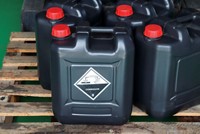Advertisement
Grab your lab coat. Let's get started
Welcome!
Welcome!
Create an account below to get 6 C&EN articles per month, receive newsletters and more - all free.
It seems this is your first time logging in online. Please enter the following information to continue.
As an ACS member you automatically get access to this site. All we need is few more details to create your reading experience.
Not you? Sign in with a different account.
Not you? Sign in with a different account.
ERROR 1
ERROR 1
ERROR 2
ERROR 2
ERROR 2
ERROR 2
ERROR 2
Password and Confirm password must match.
If you have an ACS member number, please enter it here so we can link this account to your membership. (optional)
ERROR 2
ACS values your privacy. By submitting your information, you are gaining access to C&EN and subscribing to our weekly newsletter. We use the information you provide to make your reading experience better, and we will never sell your data to third party members.
Persistent Pollutants
EPA faces lawsuit over PFAS in fluorinated plastics
Agency failed to address risks to human health within time frame required by US law, public health groups say
by Britt E. Erickson
May 22, 2024
| A version of this story appeared in
Volume 102, Issue 16

Public health groups are continuing to push the US Environmental Protection Agency to ban a fluorination process that improves the barrier properties of high-density polyethylene plastic containers. The process creates per- and polyfluoroalkyl substances (PFAS), including harmful perfluorooctanoic acid (PFOA), as by-products. Texas-based Inhance Technologies is the only company that uses this method in the US.
In a May 17 notice, Public Employees for Environmental Responsibility and the Center for Environmental Health (CEH) informed the EPA that they intend to sue the agency for not taking action to reduce the risk posed by PFOA formed as a by-product during the fluorination of plastics. PFAS can leach into liquids stored in the treated containers, according to EPA studies.
The EPA is obligated to act under the Toxic Substances Control Act (TSCA) within 180 days of receiving information that a chemical may present a significant risk to human health. The agency has known about the presence of PFOA in fluorinated plastic containers since at least March 29, 2023, the groups say.
The groups’ notice of intent to sue the EPA comes 2 months after the US Court of Appeals for the Fifth Circuit ruled that the agency had overstepped its authority in 2023 when it ordered Inhance to stop making PFAS as by-products. In that case, the agency claimed that Inhance violated a 2020 significant new-use rule that requires companies to notify the EPA before they begin making long-chain PFAS. But the court ruled that Inhance’s process is not subject to the rule because the decades-old process is not a new use.
“EPA cannot simply walk away from the dire health threat of PFOA in plastic containers because of the 5th Circuit decision,” Bob Sussman, attorney for the CEH, says in a statement. The agency is obligated under TSCA to address the threat, he says.
Inhance treats about 11 million kg of plastic annually. In response to the court decision in March, the company said in a news release that it is committed to continuing research to reduce the formation of PFAS. The company claims that it has already reduced the formation of PFAS by more than 90%.





Join the conversation
Contact the reporter
Submit a Letter to the Editor for publication
Engage with us on Twitter